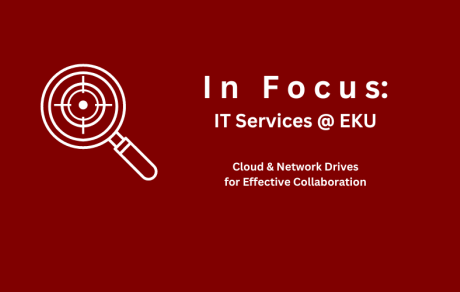In Focus on Services - Cloud & Network Drives for Effective Collaboration

Collaboration is an important ability in the world of academia and work today. It is imperative for our university community to navigate the digital landscape with discernment, particularly when handling the storage and sharing of sensitive university data. Here we delve into the intricacies of EKU's file sharing and storage guidelines. Our goal is to fortify your digital work, ensuring it not only meets the highest standards of security but also enhances your efficiency.
The Basics: Choose Wisely, Share Responsibly
EKU provides cloud services, like Office 365 OneDrive (1 TB storage per person) and Google Drive (100 GB storage per person), and local network drives (e.g., P:, N:, S:) for communication and collaboration. However, the nature of the information you're dealing with should be a guiding factor. Personal cloud services like Dropbox should strictly be reserved for personal storage–not university data. If you're using such services for university files, it's time to make the switch to EKU-sanctioned storage areas.
Internal sharing is simplified through IT, but external sharing requires caution. Understanding the available sharing mechanisms and regularly reviewing permissions ensures that information is shared only with the intended parties.
Sensitive Information: Handle with Care
Sensitive information, ranging from Personally Identifiable Information (PII) to proprietary and regulated data, demands special attention. Store sensitive information on network file space in restricted directories, not on individual computers or removable devices. Laptops and mobile devices should only house sensitive data if absolutely necessary and with robust security measures in place.
Cloud-based locations like OneDrive and Google Drive should not be the default choice for storing sensitive information unless explicitly directed to do so.
Where to Share: Choosing the Right Service
EKU offers various managed file-sharing and collaboration options to meet different needs. The Service Guidelines below help you decide which option suits your requirements:
- EKU File Servers: Suitable for storing and sharing files of any sensitivity level.
- N: network drive. Most departments have an N: drive location, and permissions typically allow users in that department read-and-write access. Great for interdepartmental collaboration.
- P: network drive. Created for projects and allows multi-department collaboration on files.
- Secure Data Storage Service (S: network drive): Ideal for restricted and sensitive data like PHI, SSN, PII, student records and medical records. Contact the IT Service Desk for this level of security.
- SharePoint (sp.eku.edu): An option for administrative and highly sensitive files, excluding legally or contractually restricted data.
- Office 365 OneDrive or Google Drive: Designed for sharing teaching and learning files and other content among employees and students. These can be used to share files with anyone with internet access, not just EKU-specific people like our local drives.
- Google Shared Drive: Like a Google Drive but ownership is not tied to an individual user. Contact the IT Service Desk for details.
Usage and Service Guidelines: A Quick Reference
- Public Data: All platforms are suitable.
- Internal: Non-Sensitive: All platforms are suitable.
- Internal: Sensitive: All platforms except Office 365 OneDrive or Google Drive.
- Legally/Contractually Restricted: Secure Data Storage Service (S: drive) is recommended.
Managing File Permissions
Managing data sharing is crucial. By creating folders, you can organize your stored files and dictate access privileges a.k.a permissions.
Access options encompass “read-only” or “full rights.” Granting permission for file access within a specific folder does not automatically extend to the entire folder's contents.
Important Notes
- If someone is the “owner” of shared resources on a cloud drive and leaves the university, Google and Microsoft will delete those drives; so content would need to be backed up or transferred. Google Shared Drives and SharePoint are exempt from this problem.
- Access to cloud drives is discontinued for graduating and departing students. Any files they want to keep should be migrated to personal storage by their last date at the university.
Remember to adhere to University policies and applicable laws when sharing files electronically. By following these guidelines, you contribute to a secure and collaborative digital environment at EKU.